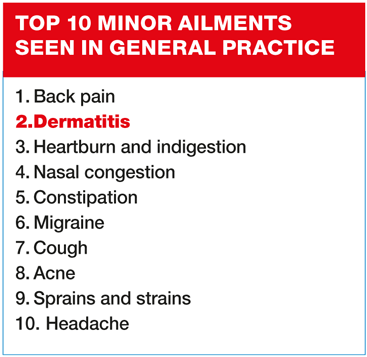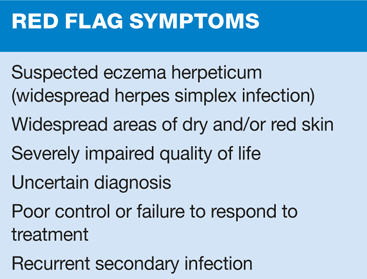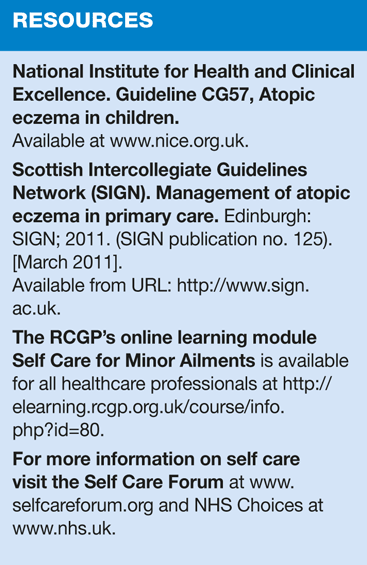Atopic eczema
Dr Knut Schroeder FRCGPGP, Concord Medical Centre, Bristol and Honorary Senior Clinical Lecturer in ...
Dr Knut Schroeder FRCGPGP, Concord Medical Centre, Bristol and Honorary Senior Clinical Lecturer in Primary Health Care, University of BristolSelf Care Forum Board member and author of 'Diagnosing Your Health Symptoms For Dummies' & Sara Richards RN Specialist Primary Care Nurse, Practice Nurse Facilitator, Berkshire Self Care Forum Board member
Eczema (dermatitis) is the second most common minor ailment seen in primary care, resulting in 6.8 million consultations per annum. This is the second in a series of articles examining the most commonly presenting minor ailments and summarises the information to share with patients
WHAT IS ATOPIC ECZEMA?
Atopic eczema is an often persistent or recurrent dry skin condition. The skin can appear red, swollen, crusty and cracking, commonly leading to itching and even bleeding. The condition tends to start in childhood and, in addition to environmental factors, often has an allergic component, which is why those suffering from eczema frequently also have asthma or hay fever, or both.
HOW COMMON IS IT?
Atopic eczema is extremely common - about two to 10 out of every 100 people suffer in the UK.
WHAT CAN PATIENTS EXPECT?
The severity of eczema can range from very mild to quite severe, with most sufferers lying somewhere in between. Unfortunately, while there is no known cure, there are many effective treatments available to alleviate symptoms and reduce inflammation. Many children with eczema 'grow out' of it by the time they reach adolescence.
WHAT CAN PEOPLE DO TO HELP THEMSELVES?
It can help to avoid using soap and bubble bath frequently, as both can dry out the skin. Whenever possible, it is best to avoid scratching the skin with the fingernails and instead rub itchy patches gently with the fingertips. Extremes of temperature may also exacerbate eczema. Dressing appropriately for a hot or cold environment, or avoiding temperature extremes altogether can, therefore, reduce symptoms. Synthetic garments can also trigger eczema, and wearing clothes made of cotton is often preferable. Dry wrap dressings can provide a physical barrier to scratching and help retain emollients.
WHICH OTC PREPARATIONS CAN PEOPLE USE?
Eczema causes the skin to become dry, and the dryer the skin becomes, the higher the chances that symptoms will exacerbate. Emollients such as lotions, ointments, creams and shower or bath additives substitute the oils that are missing from the skin. They help to keep skin hydrated and smooth, which protects against irritants. Using emollients regularly, frequently and liberally is the most important part of managing eczema. The pharmacist can advise on the wide range of suitable preparations available, but people may need to try out different products, to balance efficacy and personal preference. For example, some people are sensitive to the bases of some emollients. In general, greasier ointments, which contain a high proportion of oils, work better than thinner creams or lotions, which have a higher water content than ointments. Advise patients that oily bath or shower additives can make the bath tub or shower slippery, and so using a rubber mat can help avoid slipping and falling.
Weak topical steroids, such as hydrocortisone 0.5 to 1% or clobetasone 0.05%, applied once or twice daily, can help reduce inflammation in mild-to-moderate eczema in adults and children aged over 10 or 12 years (depending on the product). OTC steroid preparations cannot be used on the face, anal or genital areas without medical advice, and use should be restricted to a maximum of seven days unless directed otherwise by a health professional.
WHEN SHOULD PATIENTS RETURN?
Patients should seek medical advice if they experience any of the red flag symptoms listed in the box, have problems sleeping, suffer psychologically or if their eczema becomes weepy or painful.
WHAT ARE THE NEXT STEPS?
By using a stepwise and tailored approach, health professionals should advise on further treatment options, which initially include stronger topical steroids (such as topical betamethasone 0.1% once daily for areas other than the face and neck). Oral antibiotics, for example flucloxacillin (or erythromycin in patients with a penicillin allergy), can help with treating infected eczema. Topical tacrolimus may be used intermittently and short term for moderate-to-severe atopic eczema not responding to topical steroids.
SUMMARY
Although there is no cure for eczema, various treatment options are available to improve symptoms and quality of life. Recommend the liberal use of topical emollients as an essential means of managing eczema successfully.



